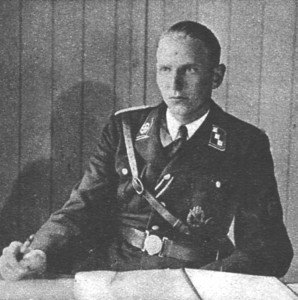By Chris Warren
A Twenty First Summer article from December 13, 2014 was about men who started life as ordinary citizens but when duty called they stood up to defend the United States in World War II, rightfully earning the title of “hero” and a place of high honor in history. At the other end of the scale are those who have committed ghastly war crimes and not only are they never punished, they aren’t the least bit remorseful. Two divergent paths: One ending with the pride and thanks of a grateful nation, the other ending in complete defeat of the genocidal megalomania of Adolph Hitler, a historical figure so profoundly offensive that seven decades after his death it’s still creepy to see his name in print.

Soren Kam could have taken his life in a different direction; now he is one of the reasons why we should keep Hitler’s name in circulation for the higher purpose of making sure the hate he preached doesn’t spread too far. Kam, who recently died at the age of 93, was a Danish citizen who joined the Nazi party during World War II. He is suspected of helping identify Danish jews so they could be deported to concentration camps, and at the time of his death remained one of the most wanted war criminals. He was also a highly decorated SS officer who murdered an anti-Nazi newspaper editor. And, like most Nazis, it’s almost a certainty that he is guilty of many other crimes that cannot be proven back to him.
A common argument floating around is that all the escaped Nazis are now in their 90’s and there is no practical reason to go after them. In a loose way, the argument holds up: A ninety-something year old man is typically not a danger to society. Spending considerable time and money to apprehend him and place him on trial just to prove a philosophical point seems like an unfruitful use of resources. The problem with this argument is it implies that justice means less the longer someone can run away from it and it tramples on the feelings of victims and their descendants. Giving evil men a pass, just forgetting about it, letting bygones be bygones –whatever trite label one wants to stick on it– benefits no one except the guilty.
What is particularly crude about Soren Kam is that he did not deny his involvement in the Nazi party and by many accounts was even proud of it right up to his death. He escaped to Germany after the war and exploited legal loopholes to avoid extradition back to Denmark. He lived a comfortable lifestyle as a free man for many decades and was never held accountable for his crimes. Knowing this adds greatly to the burden carried by the victims. There is already little solace for the aggrieved; no one should think that the passage of time makes them whole.
Decent people will wonder how someone who was involved in one of the most monstrous crimes in recorded history could so easily and openly get away with it. One of the faults of decent people is that in our hearts we so badly want to think life is fair when in our heads we know it isn’t. This conflict is never resolved. We spend more energy than we probably should being angry at the injustices we see, not because the anger isn’t warranted, but because no purpose is served by it.
The best we can get out of the barely-human filth that was Soren Kam is that it is his thought process, not ours, that is screwed up. There is a justice system not of this Earth which always makes the right call and ultimately gives everyone exactly what they deserve. Believing some version of karma will sentence people like Kam to the punishment they did not receive during their biological lifetimes doesn’t go very far to settle the hearts of the victims’ families in the here and now, but that, along with the empathy of decent people everywhere, is as close to a fair deal as they are going to get.